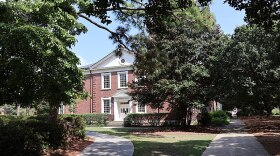The UNC Board of Governors plans to freeze tuition for in-state students next school year, making it the eighth year the board has kept tuition the same for undergraduate North Carolina students in its 16-school system.
UNC System President Peter Hans said the board’s commitment to affordability in higher education is important to North Carolina students and parents.
“In real dollars, that means tuition at our public universities is lower today and will be lower next year than it was at the end of the Obama administration,” Hans said. “There's not a single other state in the country that can claim a similar achievement. Not one.”
At the majority of the UNC System’s institutions, tuition averages about $4,700 for in-state undergraduate students.

However, that doesn't include the four NC Promise institutions: Elizabeth City State University, Fayetteville State University, University of North Carolina at Pembroke and Western Carolina University. There, tuition is capped at $500 per semester or $1,000 per year for in-state students.
When adjusting for inflation, in-state tuition and fees in the UNC System has decreased by $1,363 since the 2014 school year. The decrease for non-NC Promise institutions is $856.
At a budget and finance committee meeting Wednesday, some board members expressed concerns about how this might look on the other end for universities.
“I’m in favor of keeping costs down,” said board member Kellie Hunt Blue, “but I would like to see in the wake of inflation how this will impact some of the campuses.”
Board member Joel Ford echoed this point, noting the rising costs of goods and services with inflation.
“It appears on the outside looking in, we’re asking our institutions to hold themselves harmless from the outside market impact forces,” Ford said. “Our institutions are having to essentially tighten their belts, find efficiencies, make adjustments in order to stay in line with their flat revenue stream.”

Hans said he’s discussed the tuition freeze with every chancellor in the UNC system.
“Not one chancellor has indicated concern with me about continuing this course of action,” Hans said. “That we've been able to take a pause for eight years has been very important to the student debt levels being reduced. And that is a major priority of this board.”
The largest expense on campuses is paying for faculty and staff, and the pressures of those costs have been offset by the NC General Assembly, he added.
“Over the past two years, we’ve received generous increases from the legislature,” Hans said. “We’re very optimistic again about increases this year and next as well. So, that would meet that largest obligation that we have to our faculty and staff through compensation from the state.”
Tuition is used to pay for faculty and staff salaries, student services like libraries, academic support and other “critical needs,” according to the UNC System.
Ford said that although the system has been able to support the tuition hold, he still has concerns about how long it can continue.
“Our legislative leaders have made some tremendous important fiscal policy decisions that have put this state in quite honestly a surplus position,” Ford said. “I'm not as confident that going into the future that this will be the case.”
“At some point, we will have to make some tough decisions as it relates to the economy contracting itself and the state not having the surplus that we have right now.” Ford continued.
Hans said he would like to see the tuition freeze go on for at least a full decade and continue the board’s focus on affordability.
“Poor and working class families too often get the message that college is out of reach. That college debt is crashing, that degrees don't pay off,” Hans said. “We need to say clearly that in North Carolina, that simply isn't true.”
The board will allow proposals from universities to increase tuition for out-of-state students and all graduate students. Schools can also submit fee proposals, as long as it doesn’t exceed a 3% increase from last year’s fees.







